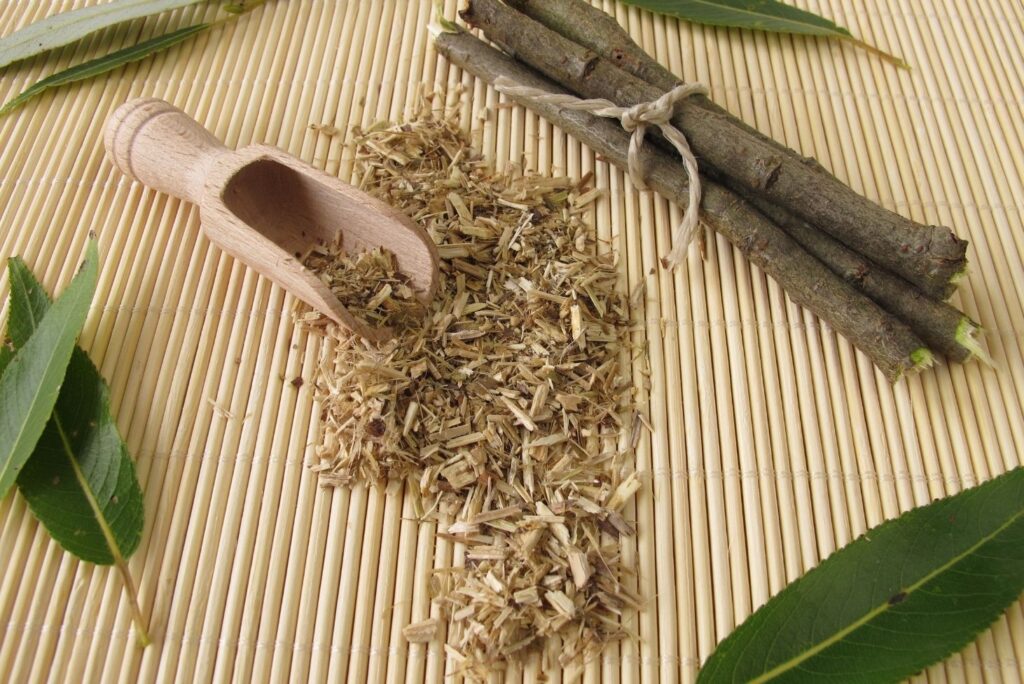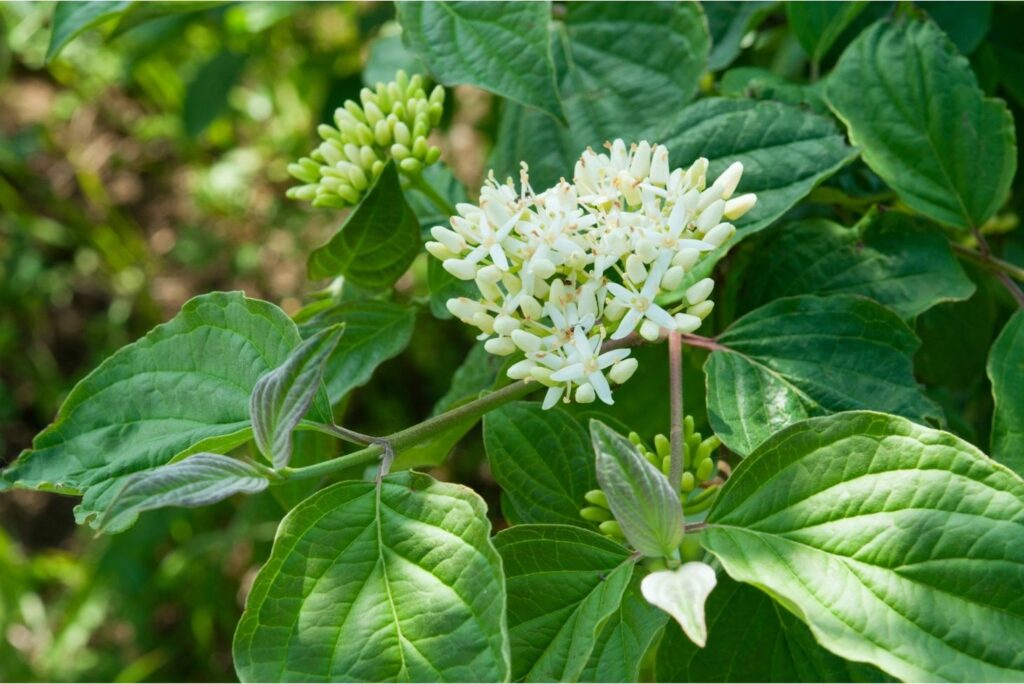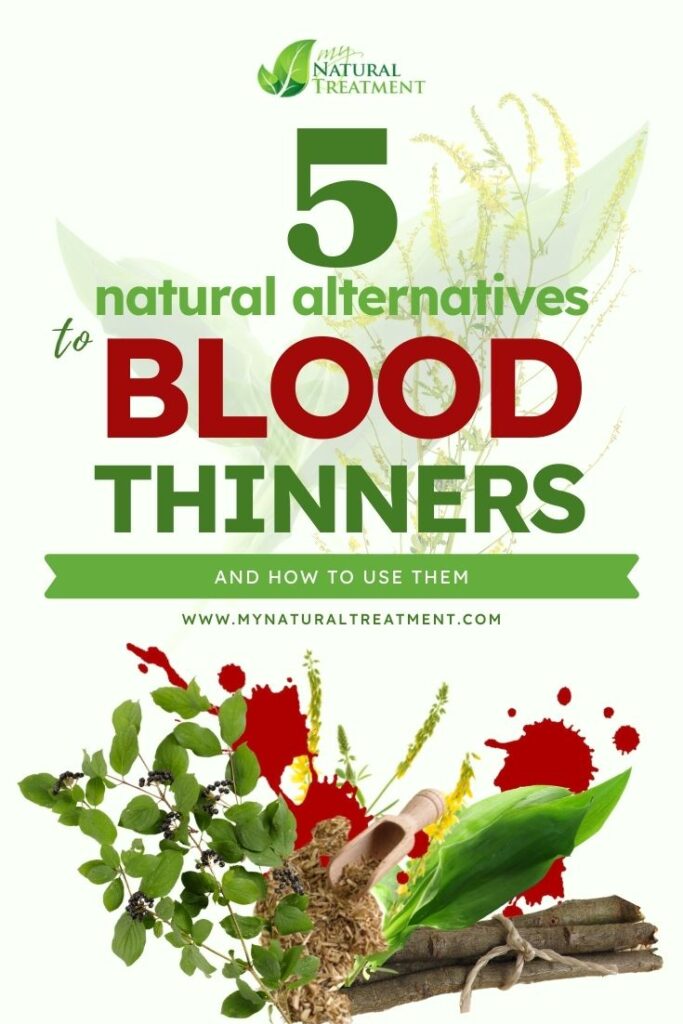Looking for natural alternatives to blood thinners and want to know what foods thin the blood? Continue reading this article and find out what they are. But first.
Natural blood thinners from medicinal herbs work on thinning the blood and are great natural alternatives to prevent blood clots and fluidize the blood. Given the numerous severe adverse events following the novel medical treatments related to blood clots and unusual blood coagulation, we want to share with you what are the best natural alternatives to blood thinners.
These natural blood thinners come from herbs and other natural extracts and don’t have the same side effects that synthetic blood-thinning drugs have. However, it’s important to consult with a naturopath if you experience any of the symptoms of blood clotting, or if your D-Dimer test shows increased value.

Important! If you have any type of hemorrhage (including prolonged menstruation, nose bleeding, wounds that don’t heal, or any unusual bleeding, etc), please consult a medical doctor or a naturopath.
In This Article You Will Find:
5 Best Natural Alternatives to Blood Thinners
1. Willow Bark Extract
(Salix alba)
The natural alternative to aspirin, white willow bark is one of the most powerful natural alternatives to blood thinners, but without the side effects. White willow contains salicin, which is converted by the body into a salicylate similar to the blood-thinner aspirin. Herbs with salicylate constituents help to reduce platelet aggregation and prevent blood clotting, and willow bark contains high concentrations of salicylates with blood-thinning action, according to this study.
How to Use Willow Bark as Natural Blood Thinner
One of the easiest ways to use willow bark is in its powder form, of which you can have 3 teaspoons a day. If you want to learn more, we have posted another article on how to make natural aspirin at home from willow bark extract, which you can read here.

2. Wild Garlic Tincture
(Allium ursinum)
Wild garlic tincture is probably the most powerful remedy in the European flora for thrombosis, inflammation of the veins, and varicose veins especially. It is rich in adenosine, an inhibitor of platelet activation, with a known role in lowering cholesterol and blood pressure, maintaining the flexibility and permeability of blood vessels, and preventing the formation of blood clots. Wild garlic extract has more powerful blood-thinning effects compared to regular garlic, but they both have proven natural blood-thinning effects.
How to Use Wild Garlic Tincture as Natural Blood Thinner
Wild garlic tincture or extract is the most effective way to use garlic as a supplement in preventing and treating blood clots. Use it as prescribed on the leaflet or after consulting a naturopath.

3. Yellow Sweet Clover
(Melilotus officinalis)
Yellow sweet clover is one of the best natural alternatives to blood thinners, and the reason is that this medicinal herb is rich in coumarins. Coumarins are the major constituent of melilot they are blood thinners used to keep blood flowing smoothly and prevent the formation of blood clots. As the plant dries, coumarins are converted to dicoumarol, a powerful anticoagulant. This medicinal herb has been used as a remedy for varicose veins, hemorrhoids, phlebitis, and thrombosis since very old times.
How to Use Sweet Yellow Clover as Natural Blood Thinner
Pour a cup of boiling water over a tablespoon of dried yellow sweet clover. Steep for 15 minutes, then strain. Drink 3 to 4 cups a day. Follow the cure for 21 days, pause for 2 weeks, and resume if needed.

4. Common Dogwood Bud Extract
(Cornus sanguinea)
This gemmotherapy herbal extract is one of the most powerful natural anticoagulants, recommended when tests show high resistance to heparin (synthetic blood thinner). Common dogwood buds extract is adjuvant in myocardial infarction, prevention of heart attack, arthritis of the lower limbs, thrombophlebitis, and one of the most potent natural alternatives to blood thinners. A 2016 study detected quercetin derivatives in the extract of fresh dogberries. Learn more about gemmotherapy products for blood and heart here.
How to Use Common Dogwood Bud Extract as Natural Blood Thinner
Adults: generally 2-3 ml (1 ml = approx. 25 drops), in a little water, once a day, before meals. The duration of administration can vary between 1-3 months. Pause for 1 or 2 months and resume if needed. Or use it as directed by your healthcare practitioner.

5. Nattokinase
One of the best natural alternatives to blood thinners is nattokinase. In Japanese medicine Nattokinase has played an important role for over 1000 years, as a remedy for cardiovascular diseases, due to its natural properties to cleanse the blood vessels, lower blood pressure and reduce cholesterol. Nattokinase is an enzyme extracted from fermented soybeans and known for its strong fibrinolytic activity, which means it thins the blood and prevents blood clots.
How to Use Nattokinase as Natural Blood Thinner
Oral capsules are the best way to use nattokinase as a blood thinner. Take them according to the information on the package.
What Foods Thin The Blood?
The top foods that are natural blood thinners are:
- Fresh tomato juice – (200 ml) of freshly squeezed tomato juice (not pasteurized) 3 times a day, for 30 days
- Lemon juice and citrus fruit juice
- Raw garlic
- Fresh ginger – 4 g of fresh ginger, two or three times a day, over the course of 2-3 months
- Flaxseed oil – 1 tablespoon of flaxseed oil on an empty stomach in the morning (not recommended if you suffer from gallstones or diarrhea)
- Root vegetables – carrot, parsley, celery, radish, parsnip
- Wild berries – raspberries, blueberries, strawberries, hawthorn, rosehip

AVOID: Leafy greens (loaded with Vitamin K, which acts as a natural coagulant), processed meat products, smoked meats, deep-fried foods, junk foods, excess salt, and processed sugary products in combination with smoking, coffee, and alcohol drinking increase the risk of developing blood clots!
Why Natural Blood Thinners?
Natural blood thinners such as willow bark, wild garlic, sweet yellow clover, nattokinase, and common dogwood have comparable blood-thinning effects to synthetic drugs. The main difference is that natural blood thinners do not have adverse reactions, because they use plant intelligence in a unique combination of healing substances that work synergetically. On the other hand, conventional blood thinners are synthetic, and the body does not know how to decipher these substances, hence the many side effects. Please consult a natural health practitioner before following a blood-thinning treatment. Stay healthy, naturally!
Share on Pinterest ❤️


2 comments
Hello Andreea & the MNT Team
I found this site recently from your Telegram Channel. You are very informative and providing this detailed information is a great service in these times of toxic injections and pathogens being pushed into people.
As I am in my 60s, I already had changed my nutritional habits 20 years ago. But now i am in this new phase learning about the benefits of natural sourced herbs, flowers and uses of vitamins. I have my daily “concoction” health drink, plus regular mix of VitD3, & K2. Occasionally a herbal tea strengthened with fragments of hibiscus with teaspoon of pure honey. I am now looking at this blood thinner –
Please keep up the good work. Andrew
Hi, Andrew! So happy that you have found us and shared your story here. We try to empower people around the world with this information, because there is always a natural way, less intrusive and (almost all the time) less expensive for health problems. This article is well-researched and I hope you find some new information here to add to your general knowledge on herbal remedies. Much health to you, and thank you for dropping by! Andreea